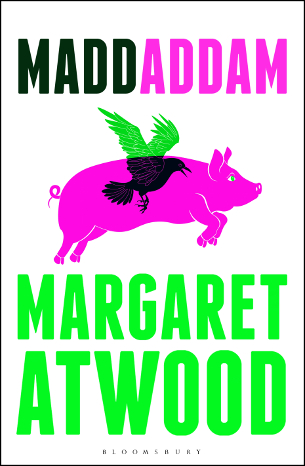Why you can trust 12DOVE
Maddaddam by Margaret Atwood review .
Twenty-eight years ago, Margaret Atwood published one of the all-time great dystopias. The Handmaid’s Tale is a silent, shattering scream of a novel: a thoughtful, provocative portrait of an individual caged, body and mind, by a future US returned to Old Testament family values.
Yet for a long time Atwood kept science fiction at arm’s length; in 2003, she famously dismissed it as “talking squids in outer space”. SF fans overreacted, as SF fans are wont to do, and in the interim Atwood has revised her position. In her 2011 essay collection In Other Worlds , she called SF “romance”: not like Twilight , but in the 19th century sense of deliberately non-realist fiction, uninterested in characters with psychological depth or settings with verisimilitude.
This, then, is Atwood’s understanding of SF: it’s about stuff that isn’t true, which by definition doesn’t need to make logical or emotional sense. Boy, does this show in MaddAddam .
It’s the near future, and things are grim. You can tell this because murder is televised and everything is run by a bunch of (boo! hiss!) corporations that seem to have been named by eight-year-olds (HelthWyzer, AnooYoo, CryoJeenyus, and the dreaded enforcers CorpSeCorps). Then a guy with a god complex genetically engineers a new, peaceful, semi-lobotomised form of humanity, the Crakers, and makes space for them by creating a plague to wipe out everyone else.
If this synopsis sounds familiar from earlier volumes in the same trilogy, Oryx And Crake and The Year Of The Flood , that’s because MaddAddam is essentially the same story. Ostensibly, the final instalment picks up where the others left off, following a small band of human survivors trying to build a life in the ruins of an unspecified North American city, and co-exist with the strange creatures who share it. In reality, though, this potentially fascinating tale – of post-human innocents in a far-from-innocent world, and the dynamics of an embattled, post-apocalyptic mini-society – is largely ignored in favour of long, dull flashbacks recapping how we got to this point. Yes, in case we hadn’t fully taken on board the gruesomeness of Atwood’s future-America the first two times, here it is again in all its luridly ill-thought-out glory, seen this time through Zeb, the personality-free paramour of Flood’s protagonist Toby.
Venerable US magazine Publishers Weekly praised MaddAddam as satire, but without saying what’s actually being satirised – perhaps because the novel’s aim is so scattershot it’s hard to make out a target. If it is satire, it’s neither clever nor funny: the anti-environmentalist “Church of PetrOleum”, for example, domain of Zeb’s tyrannical father, is clearly meant as a comment on American car-worship and climate-change scepticism, but the tortured pun of its name is as far as the satire goes (St Peter was the “rock” on which the Christian church was founded, oil is used for anointing in the Bible, so God wants us to drive gas-guzzlers). The villainy of the pastor lies in the fact that he’s a (cartoonishly) sadistic child-abuser, not his addled politics, which are barely mentioned.
MaddAddam is, in short, a baffling book. There are moments of sharp insight; Toby’s retellings of Zeb’s story to the sweetly naïve Crakers are brilliant snapshots of the difficulty of explaining a lost world to people who can’t possibly understand it, while the problems that lie ahead for women of child-bearing age in a society stripped of medical expertise are gestured to, briefly. But the characters are names on a page, not people, and the story Atwood wants to (re)tell is far down the list of the most interesting things that could be explored in this scenario. Coming from such a great writer, it’s a crushing disappointment.
Nic Clarke twitter.com/bibliolicious
Read more of our book reviews .
SFX Magazine is the world's number one sci-fi, fantasy, and horror magazine published by Future PLC. Established in 1995, SFX Magazine prides itself on writing for its fans, welcoming geeks, collectors, and aficionados into its readership for over 25 years. Covering films, TV shows, books, comics, games, merch, and more, SFX Magazine is published every month. If you love it, chances are we do too and you'll find it in SFX.
Most Popular








